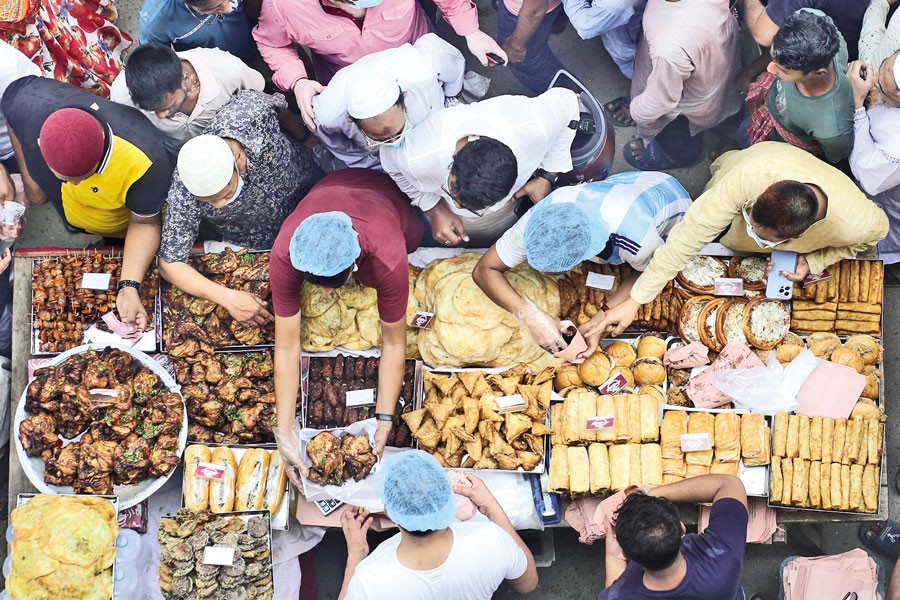
Published :
Updated :

Koltabazar Panchayat delivers iftar to poor people every day. Panchayat, have we heard this name? Maybe in the famous Indian web series, we learned about Panchayat. It is a local system that once existed to serve the administrative duties in several areas of the big cities. It might be astonishing to today's generation that those Panchayats once ruled Dhaka. Since the government can work on the root level, we no longer need this system. But do we know that some panchayats still exist in the capital? That too they are working relentlessly to serve the poor people of their locality? Koltabazar Panchayat is one of those who give away iftars to hundreds of poor people every day.
Selim Hazi is currently the head of the Koltabazar Panchayat. He has been serving in this position for more than three decades. He is also the commissioner of old Dhaka's 26 no: ward Koltabazar area and the founder of Al Moeen Trust.
Selim Hazi is now 76 years old. He is suffering from many diseases, but his kidneys have taken a lot away from him. he has to go three times a week for dialysis. Months ago, he lost his dearest nephew. Amidst this, severe physical and mental conditions could not stop Selim Hazi. He arranged iftars for low-income people and supported the Panchayat's efforts. How does he manage all this?
"This is for the tradition, how we have been taught, grown-up. It may surprise you, but to me, it's just a regular activity. I have seen my father doing this, so I am taking his legacy forward. after my death my children will do the same," said Selim Hazi, sitting on a chair supported by his help.
Selim Hazi arranged free iftars, but this is on his own. The Koltabazar Panchayat does the main iftar giveaway, and Mohammed Maju, an executive member of Koltabazar Panchayat, monitored the whole thing.
Mohammed Maju said, "We don't have a fixed number, but we feed around 100 people daily at Iftar. From Alu chop and Beguni, with fruits like apples, dates, range, and bananas, to liquids like water and sometimes juice, we prepare for the Iftar.
Around 10 to 15 people work voluntarily daily to make this iftar successful. Iftars are prepared at home. Sometimes, families contribute by sharing their homemade iftars to this arrangement. Students from Madrasa work in distributing the iftars.
In this regard, Mohammed Maju said, "We don't have a dedicated team. The beauty of this iftar giveaway is everyone loves to participate. There is no pressure on someone. People do it out of responsibility, out of love and compassion. This is the beauty of this holy month."
Mohammed Maju remains busy a month before Ramadan starts because he has another duty to perform for the Panchayat: giving necessary grocery items for the whole of Ramadan to 12 hundred families!
Abul Bashar, an elderly resident of the area, has been unemployed for the last couple of years and has to run a family of six. He gets all the necessary things on Ramadan from this Panchayat.
He said, "They provide rice, oil, lentils and flour, but if I need anything, I prepare a list and give it to them before a month or two of Ramadan. So, before Ramadan starts, I get all of these things."
In Dhaka, Panchayat was dominant in the Mughal and post-Mughal eras by the nawabs of Ahsan Manzil. From the late 19th century to the mid-20th century, many Panchayats ruled over the areas of Dhaka. The head of the Panchayat was called Sardar. They were selected by the nawabs who could perform duties on behalf of them.
The Panchayat had to do justice for the residents of their respective areas. They arranged and monitored everything from caring for the families, health, and marriages to amusement and festivals. This is the legacy of the Panchayat system. Now, only the welfare works are done by the remaining Panchayats of Dhaka. Koltabazar Panchayat has been maintaining its legacy.


 For all latest news, follow The Financial Express Google News channel.
For all latest news, follow The Financial Express Google News channel.